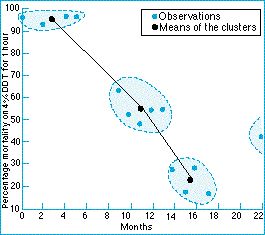The theory of natural selection (part 1) - Are there examples of rapid evolutionary change?

Preventing malaria by killing mosquitoes
Malaria can be prevented by killing the local mosquito population, and health workers have recurrently responded to malarial outbreaks by spraying insecticides such as DDT in affected areas. DDT, sprayed on a normal insect, is a lethal nerve-poison. When it is first sprayed on a local mosquito population, the population goes into abrupt decline. What happens then depends on whether DDT has been sprayed before.
DDT becomes ineffective quickly
DDT-resistant mosquitoes were first detected in India in 1959, and they have increased so rapidly that when a local spray program is begun now, most mosquitoes become resistant in a matter of months rather than years.
DDT becomes ineffective so quickly now because DDT-resistant mosquitoes exist at low frequency in the global mosquito population and, when a local population is sprayed, a strong force of selection in favor of the resistant mosquitoes is immediately created. It is only a matter of time before the resistant mosquitoes take over.
Figure: increase in frequency of pesticide resistance in mosquitos after spraying with DDT. A sample of mosquitos was captured at each time indicated and the number that were killed by a standard dose of DDT (4 % DDT for 1 hour) in the laboratory was measured. From Curtis et al. (1978).
| Next |



